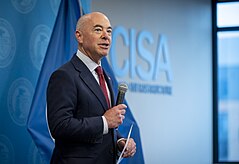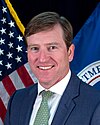Cybersecurity and Infrastructure Security Agency
 Seal of CISA | |
 CISA's future headquarters on the Elizabeth's Campus in Washington, D.C. | |
| Agency overview | |
|---|---|
| Formed | November 26, 2018 |
| Preceding agency |
|
| Jurisdiction | United States Federal Government |
| Headquarters | Washington, DC, United States |
| Motto | "America's Cyber Defense Agency" |
| Employees | 3,161 (2023)[1] |
| Annual budget | $2.9 billion (2023) |
| Agency executives |
|
| Parent department | Department of Homeland Security |
| Website | cisa |
The Cybersecurity and Infrastructure Security Agency (CISA) is a component of the United States Department of Homeland Security (DHS) responsible for cybersecurity and infrastructure protection across all levels of government, coordinating cybersecurity programs with U.S. states, and improving the government's cybersecurity protections against private and nation-state hackers.[4]
The agency began in 2007 as the DHS National Protection and Programs Directorate.[4][5] With the Cybersecurity and Infrastructure Security Agency Act of 2018, CISA's footprint grew to include roles in securing elections and the census, managing National Special Security Events, and the U.S. response to the COVID-19 pandemic.[6] It has also been involved in 5G network security and hardening the US grid against electromagnetic pulses (EMPs).[6] The Office for Bombing Prevention leads the national counter-IED effort.[7]
Currently headquartered in Arlington, Virginia, in 2025 CISA is planning to move its headquarters along with 6,500 employees to a new 10 story, 620,000 sq ft building on the consolidated DHS St. Elizabeths campus headquarters.[8]
History
[edit]The National Protection and Programs Directorate (NPPD) was formed in 2007 as a component of the United States Department of Homeland Security.[9] NPPD's goal was to advance the Department's national security mission by reducing and eliminating threats to U.S. critical physical and cyber infrastructure.
On November 16, 2018, President Trump signed into law the Cybersecurity and Infrastructure Security Agency Act of 2018, which elevated the mission of the former NPPD within DHS, establishing the Cybersecurity and Infrastructure Security Agency (CISA).[10] CISA is a successor agency to NPPD, and assists both other government agencies and private sector organizations in addressing cybersecurity issues.[11] Former NPPD Under-Secretary Christopher Krebs was CISA's first Director, and former Deputy Under-Secretary Matthew Travis was its first deputy director.[12][13]
On January 22, 2019, CISA issued its first Emergency Directive (19-01: Mitigate DNS Infrastructure Tampering)[14] warning that "an active attacker is targeting government organizations" using DNS spoofing techniques to perform man-in-the-middle attacks.[15] Research group FireEye stated that "initial research suggests the actor or actors responsible have a nexus to Iran."[16]
In 2020, CISA created a website, titled Rumor Control, to rebut disinformation associated with the 2020 United States presidential election.[17] On November 12, 2020, CISA issued a press release asserting, "There is no evidence that any voting system deleted or lost votes, changed votes, or was in any way compromised."[18] On the same day, Director Krebs indicated that he expected to be dismissed from his post by the Trump administration.[19] Krebs was subsequently fired by President Trump on November 17, 2020[20] via tweet for his comments regarding the security of the election.[21]

On July 12, 2021, the Senate confirmed Jen Easterly by a voice vote.[22] Easterly's nomination had been reported favorably out of Senate Committee on Homeland Security and Governmental Affairs on June 16, but a floor vote had been reportedly held (delayed) by Senator Rick Scott over broader national security concerns, until the President or Vice President had visited the southern border with Mexico.[23] Easterly hired new staff to monitor online disinformation to enhance what she called the nation's "cognitive infrastructure" and utilized the existing rumor control website during the 2021 elections.[24]
In September 2022, CISA released their 2023–2025 CISA Strategic Plan, the first comprehensive strategy document since the agency was established in 2018.[25]
Organization
[edit]
CISA divisions include the:[26]
- Cybersecurity Division
- National Cybersecurity and Communications Integration Center
- Capacity Building
- Joint Cyber Defense Collaborative
- Mission Engineering
- Office of the Technical Director
- Threat Hunting
- Vulnerability Management
- Infrastructure Security Division
- Bombing Prevention
- Chemical Security
- Exercises
- Infrastructure Assessment & Analysis
- School Safety
- Strategy, Performance & Resources
- Emergency Communications Division
- National Risk Management Center
- Integrated Operations Division
- Regions 1 through 10[27]
- Stakeholder Engagement Division
- Council Management
- International
- Sector Management
- Strategic Relations
Programs
[edit]The Continuous Diagnostics and Mitigations program provides cybersecurity tools and services to federal agencies.[28][29]
CISA issues "binding operational directives" that require federal government agencies to take action against specific cybersecurity risks.[30]
In March 2021, CISA assumed control of the .gov top-level domain (TLD) from the General Services Administration. CISA manages the approval of domains and operates the TLD Domain Name System nameservers. In April 2021, CISA removed the fee for registering domains.[31] In January 2023, Cloudflare received a $7.2M contract to provide DNS registry and hosting services for the TLD.[32]
CISA provides incident response services to the federal executive branch and US-based entities.
CISA manages the EINSTEIN intrusion detection system to detect malicious activity on federal government agency networks.
The National Defense Authorization Act for Fiscal Year 2021 granted CISA the authority to issue administrative subpoenas in order to identify the owners of internet connected critical infrastructure related devices with specific vulnerabilities. In 2021, CISA issued 47 subpoenas.[33]
In August 2021, Easterly stated "One could argue we’re in the business of critical infrastructure, and the most critical infrastructure is our cognitive infrastructure, so building that resilience to misinformation and disinformation, I think, is incredibly important."[34]
In 2021, CISA released a report that provided guidance for how to navigate and prevent ransomware incidents. This was due to a significant jump in recent attacks related to ransomware.[35]
Committees
[edit]Cybersecurity Advisory Committee
[edit]In 2021, the Agency created the Cybersecurity Advisory Committee with the following members:[36]
- Steve Adler, Mayor, City of Austin, Texas
- Marene Allison, Chief Information Security Officer, Johnson & Johnson
- Lori Beer, Chief Information Officer, JPMorgan Chase
- Robert Chesney, James A. Baker III Chair in the Rule of Law and World Affairs, University of Texas School of Law
- Thomas Fanning, Chairman, President and CEO, Southern Company
- Vijaya Gadde
- Patrick D. Gallagher, Chancellor, University of Pittsburgh
- Ronald Green, Executive Vice President and Chief Security Officer, Mastercard
- Niloofar Razi Howe, Board Member, Tenable
- Kevin Mandia, Chief Executive Officer, Mandiant
- Jeff Moss, President, DEF CON Communications
- Nuala O’Connor, Senior Vice President & Chief Counsel, Digital Citizenship, Walmart
- Nicole Perlroth, Cybersecurity journalist
- Matthew Prince, Chief Executive Officer, Cloudflare
- Ted Schlein, General Partner, Kleiner Perkins; and Caufield & Byers
- Stephen Schmidt, Chief Information Security Officer, Amazon Web Services
- Suzanne Spaulding, Senior Advisor for Homeland Security, CSIS
- Alex Stamos, Partner, Krebs Stamos Group
- Kate Starbird, Associate Professor, Human Centered Design & Engineering, University of Washington
- George Stathakopoulos, Vice President of Corporate Information Security, Apple
- Alicia Tate-Nadeau (ARNG-Ret.), Director, Illinois Emergency Management Agency
- Nicole Wong, Principal, NWong Strategies
- Chris Young, Executive Vice President of Business Development, Strategy, and Ventures, Microsoft
Directors
[edit]| No. | Director | Term | |||
|---|---|---|---|---|---|
| Portrait | Name | Took office | Left office | Term length | |
| 1 | Chris C. Krebs | 16 November 2018 | 17 November 2020 | 2 years, 1 day | |
| 2 | Jen M. Easterly | 13 July 2021 | Incumbent | 3 years, 132 days | |
See also
[edit]References
[edit]- ^ "CISA Hiring Hits High Score, and We're Not Done!!". 21 August 2023. Retrieved 24 August 2023.
- ^ "Leadership". US Department of Homeland Security. September 7, 2006.
- ^ "NITIN NATARAJAN". Department of Homeland Security. February 16, 2021. Archived from the original on February 23, 2021. Retrieved April 16, 2021.
- ^ a b Cimpanu, Catalin (November 16, 2018). "Trump signs bill that creates the Cybersecurity and Infrastructure Security Agency". ZDNet. Archived from the original on February 19, 2019. Retrieved December 16, 2018.
- ^ "About CISA". Department of Homeland Security. 19 November 2018. Archived from the original on 6 July 2019. Retrieved 16 December 2018.
 This article incorporates text from this source, which is in the public domain.
This article incorporates text from this source, which is in the public domain.
- ^ a b "National Risk Management Center | Cybersecurity and Infrastructure Security Agency CISA". cisa.gov. Retrieved 2023-08-24.
- ^ "OBP Fact Sheet | CISA". cisa.gov. 2023-06-08. Retrieved 2023-08-24.
- ^ Weisner, Molly (2023-08-17). "Homeland Security to break ground on new CISA, ICE offices". Federal Times. Retrieved 2023-08-24.
- ^ "DHS | About the National Protection and Programs Directorate". Dhs.gov. 2011-08-26. Archived from the original on 2011-09-25. Retrieved 2011-09-27.
- ^ "Cybersecurity and Infrastructure Security Agency". DHS.gov. Archived from the original on 23 November 2018. Retrieved 24 November 2018.
- ^ Ropek, Lucas (2020-07-28). "Will CISA Be the Savior of State and Local Cybersecurity?". Government Technology. Retrieved 2020-11-18.
- ^ Johnson, Derek B. (2018-03-18). "NPPD taps vendor for No. 2 role". Federal Computer Week. Archived from the original on 2019-09-30. Retrieved 2019-03-15.
- ^ Rockwell, Mark (2018-12-20). "Standing up CISA". Federal Computer Week. Archived from the original on 2019-09-30. Retrieved 2019-03-15.
- ^ "Emergency Directive 19-01". cyber.dhs.gov. Department of Homeland Security. 22 January 2019. Archived from the original on 3 July 2019. Retrieved 16 February 2019.
- ^ Krebs, Christopher. "Why CISA issued our first Emergency Directive". cyber.dhs.gov. Department of Homeland Security. Archived from the original on 6 July 2019. Retrieved 16 February 2019.
- ^ Hirani, Muks; Jones, Sarah; Read, Ben. "Global DNS Hijacking Campaign: DNS Record Manipulation at Scale". FireEye. Archived from the original on 25 June 2019. Retrieved 16 February 2019.
- ^ Courtney, Shaun; Sebenius, Alysa; Wadhams, Nick (2020-11-12). "Turmoil Hits Cyber Agency Engaged in Election as Staff Leave". Bloomberg News. Retrieved 2020-11-18.
- ^ "Federal cybersecurity agency calls election 'most secure in American history'". Engadget. 13 November 2020. Retrieved 2020-11-17.
- ^ Geller, Eric; Bertrand, Natasha (2020-11-12). "Top cyber official expecting to be fired as White House frustrations hit agency protecting elections". Politico. Retrieved 2020-11-13.
- ^ "Trump fires head of U.S. election cybersecurity who debunked conspiracy theories". NBC News. 18 November 2020. Retrieved 2022-07-01.
- ^ Kaitlan Collins and Paul LeBlanc (18 November 2020). "Trump fires director of Homeland Security agency who had rejected President's election conspiracy theories". CNN. Retrieved 2020-11-18.
- ^ "PN420 - Nomination of Jen Easterly for Department of Homeland Security, 117th Congress (2021-2022)". www.congress.gov. 2021-06-16. Retrieved 2021-07-12.
- ^ Miller, Maggie (2021-06-23). "Rick Scott blocks Senate vote on top cyber nominee until Harris visits border". The Hill. Retrieved 2021-07-12.
- ^ Maggie Miller. (10 November 2021). "Cyber agency beefing up disinformation, misinformation team". The Hill website Retrieved 18 December 2023.
- ^ "Strategic Plan | CISA". cisa.gov. Retrieved 2022-09-17.
- ^ "Cybersecurity and Infrastructure Security Agency Divisions & Offices". Retrieved 26 March 2023.
- ^ Cybersecurity and Infrastructure Security Agency. "CISA Regions". Retrieved 26 March 2023.
- ^ Miller, Jason (7 November 2022). "CISA signature federal cyber program warrants more than a passing anniversary nod". Federal News Network. Retrieved 26 March 2023.
- ^ Cybersecurity and Infrastructure Security Agency. "Continuous Diagnostics and Mitigations Program". Retrieved 26 March 2023.
- ^ Cybersecurity and Infrastructure Security Agency (18 May 2022). "Cybersecurity Directives". Retrieved 26 March 2023.
- ^ Cybersecurity and Infrastructure Security Agency (27 April 2021). "A new day for .gov". Retrieved 26 March 2023.
- ^ Cloudflare (13 January 2023). "Cloudflare Wins CISA Contract for Registry and Authoritative Domain Name System (DNS) Services". Retrieved 26 March 2023.
- ^ "CY2021 ADMINISTRATIVE SUBPOENA FOR VULNERABILITY NOTIFICATION YEAR IN REVIEW" (PDF). Retrieved 2023-06-16.
- ^ Klippenstein, Ken; Fang, Lee (October 31, 2022). "Leaked Documents Outline DHS's Plans to Police Disinformation". The Intercept. Retrieved 2023-01-17.
- ^ Piper, D L A (July 2021). "Cybersecurity and infrastructure security agency releases guidance regarding ransomware". Journal of Internet Law. 25 (1): 1–17.
- ^ "CISA Names 23 Members to New Cybersecurity Advisory Committee | CISA". cisa.gov. December 2021. Retrieved 2023-01-17.



